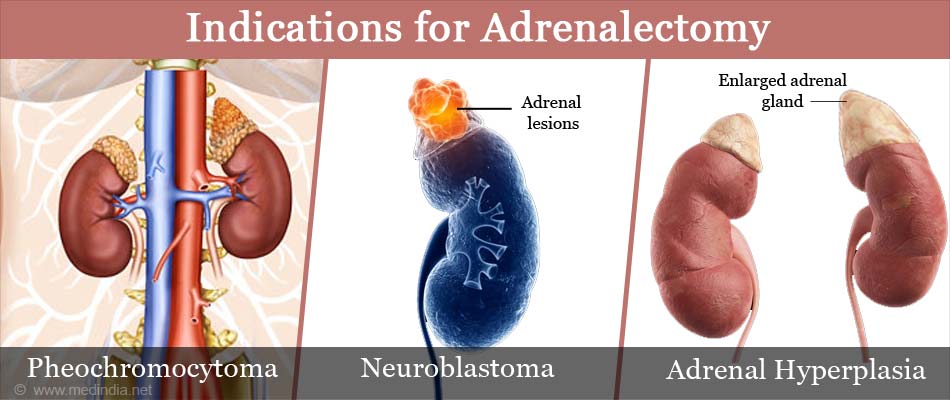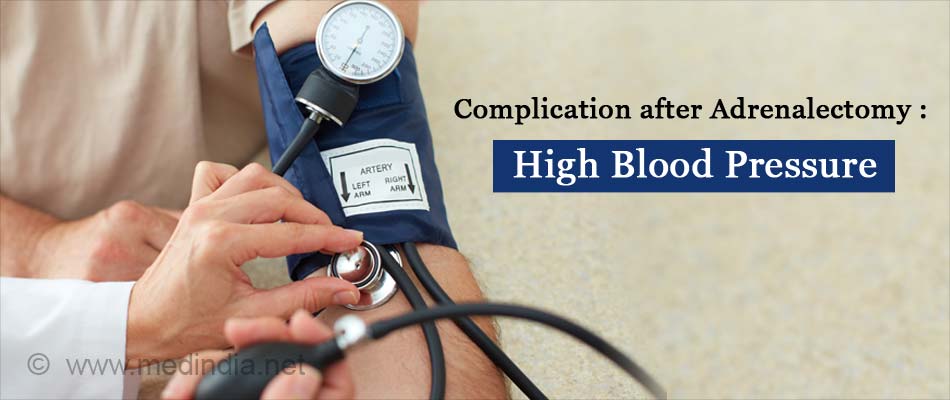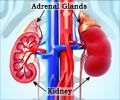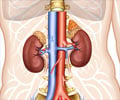What is Adrenalectomy?
Adrenalectomy is a surgery that involves removing either one or both the adrenal glands.
Adrenal glands are also called as suprarenal glands. They are positioned on the upper pole of the kidney. Adrenal glands are endocrine organs. The adrenal glands have two portions, outer layers constitute cortex and inner portion is called medulla. The cortex secretes cortisol, aldosterone and androgens. The inner medulla secretes epinephrine and norepinephrine. The hormones secreted by the adrenal medulla are important during stressful conditions.
Why is Adrenalectomy Done?
Indications when adrenalectomy is done are as follows:
- Benign adrenal lesions that cause
- Pheochromocytoma: It is an adrenal medulla tumor. It secretes epinephrine and norepinephrine. There is an increase in the sympathetic activity in these patients. The patients have high blood pressure, heart rate, palpitations, anxiety, weight loss, etc. It can be fatal when it causes a hypertensive emergency.
- Cushing’s syndrome: It is a disease due to excess cortisol exposure.
- Conn’s syndrome: It is primary hyperaldosteronism. An excess level of aldosterone is present in patients with Conn’s syndrome.
- Malignant adrenal lesions like neuroblastoma which is a cancer of certain types of the nerve cells. It is common in the adrenal gland and is seen in children.
- Metastatic tumor: Metastasis of the malignancy from other organs.
- Adrenal hyperplasia: Enlarged adrenal glands due to an increase in the cells of the adrenal gland.
- Non-functioning large adrenal tumors.
- Adrenal hemorrhage.
- Incidentalomas: Incidentally found tumors.

How do you Prepare for an Adrenalectomy Procedure?
- Type of anesthesia: Adrenalectomy is done under general anesthesia. You will fall asleep during the procedure.
- Pre-operative check up:
- Blood work, chest x-ray, electrocardiogram, medical evaluation and pre-anesthesia checkup are required before surgery.
- Avoid blood thinners like aspirin, warfarin and clopidogrel before surgery.
- Confirm with your surgeon regarding the medications to be taken before surgery.
- Take the medications on the day of surgery as per the instructions.
- For patients with pheochromocytoma, medications to decrease the blood pressure and heart rate are advised to avoid hypertensive complications during surgery.
- For patients with Cushing’s syndrome cortisone will be advised before surgery.
- Avoid cigarettes.
- Fasting before surgery: The procedure needs overnight fasting. Avoid food and water after the dinner on the day before surgery.
What Happens During an Adrenalectomy Procedure?
Depending on the plan and necessity the surgery can be performed in one of the following ways:
- Open surgery: In open surgery, the skin incision is single and large. It is mainly required for large tumors, in patients with history of abdominal surgery with adhesions and if the adrenal gland is invisible during laparoscopic adrenalectomy.
- Laparoscopy: Multiple small skin incisions are given in laparoscopy. It can be used for partial or total, unilateral or bilateral adrenalectomy. During laparoscopy, the surgeon gives an incision in the waist area to insert the laparoscope (an instrument with a tiny camera at its tip). He also makes another 2-3 small skin incisions through which the surgeon inserts the surgical instruments to remove the adrenal gland. The camera helps to view the structures and guides in the dissection and removal of the adrenal gland. After removing the gland, the surgeon closes the incisions with the sutures.
What Happens after an Adrenalectomy Procedure?
The removed adrenal gland is sent to a pathologist for examination under a microscope.
Recovery:
- You will have to stay in the hospital for 2-3 days if it is a laparoscopic surgery and for 4-5 days if it is an open procedure.
- Most patients are cared for post-operation in a regular surgical nursing unit
- Sometimes a pheochromocytoma patient may be taken to an intensive care unit to monitor the blood pressure.
- If an aldosterone-producing tumor was the reason for the surgery, serum potassium levels of the patient will be checked after the surgery and the blood pressure controlling medications will be continued.
- If cortisol-producing tumor or Cushing’s syndrome was the indication, the patient needs to take prednisone or cortisol pills post surgery till the remaining normal adrenal gland resumes production of cortisol hormone.
Post-operative Recovery:
- You can drive and do light exercise after a week.
- Avoid severe exercise for 2-4 weeks after the surgery.
- Follow-up after 2-3 weeks after surgery.
What are the Complications after Adrenalectomy?
- Bleeding
- Infection
- High blood pressure
- Anesthesia-related complications
- Injury to other organs
- Blood clots
- Wound-related problems

What is the Prognosis of an Adrenalectomy?
- It may require 2-6 weeks to recover depending on the type of approach.
- Most patients will have only minimal complications.
- There will be a decrease in the symptoms after adrenalectomy.
- In patients with adrenalectomy due to malignant indications require regular follow-up to check for the recurrence.








